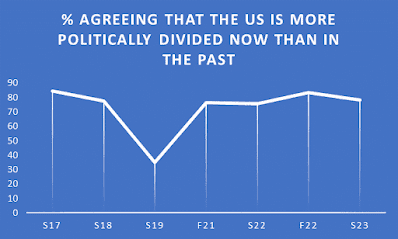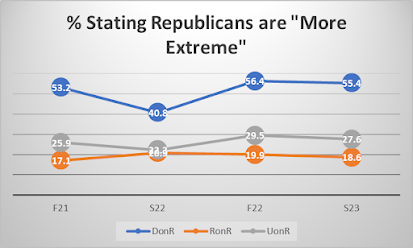By Whitney Ross Manzo and David McLennan
Recently, Representative Marjorie Taylor Greene (R-GA) gained attention for a statement in which she argued for a national divorce between red and blue states. She argued that from “the sick and disgusting woke culture issues shoved down our throats to the Democrat’s traitorous America Last policies, we are done.” Although Greene was widely criticized for her remarks, even by members of the Republican Party, her comments reflected the belief that America’s political polarization is based on wildly divergent policy positions. Her comments also suggest that polarization has increased to the point that the country may be at a breaking point.
Although there is evidence that policy differences exist,
particularly on cultural war issues, and may contribute to political polarization,
there is also a body of research that suggests that political polarization is
based on social identity differences. As opposed to differences in ideology, affective polarization is the idea that we identify with people more similar in identity to us (political affiliation, race/ethnicity, gender, sexual orientation, etc.) and feel dislike and even disgust for those who are different from us.
Using data from the Meredith Poll from 2017-2023, we set out to examine whether we find evidence of polarization among North Carolinians. Do North Carolinians perceive there to be high levels of polarization? And, are North Carolinians polarized, either by issue or by identity?
The figure above depicts the percentage of respondents who said that the United States is more divided now than in the past, over time. Except for spring 2019, this percentage is consistently well over 70%, and the average percentage who believe the US is more divided now across survey administrations is 72.9%. The highest percentage was spring 2017 at 84.6%, and the lowest is the outlier of spring 2019 at 35.1%.
This
finding surprised us, since it is so out of line with the other times we asked
this question. However, this question had an unusually high number of
respondents answer that they did not know (22%)[1]. Leaving this one poll
aside, the others indicate a general sense of polarization in the public,
regardless of which party controls the Presidency.
Affective Polarization?
The following three figures depict the responses to the question of which party is “more extreme” in its policy positions. We used this question as a measure of feeling toward other political affiliations. Across four poll administrations, over half of Republicans said Democrats were more extreme, and in three of the four polls Democrats said the same about Republicans (in spring 2022 only 41% of Democrats said this).
Additionally, a plurality of the Unaffiliated- now the largest group of voters in the state of North Carolina- consistently view both parties as more extreme. Of the two parties, Unaffiliated voters are slightly more likely to view Republicans as extreme compared to Democrats. Altogether, this is strong evidence that there is affective polarization among North Carolinians.
Unsurprisingly, we found the starkest differences between
partisans on the question of abortion. In spring 2023, we asked respondents
what kind of abortion law they feel North Carolina should implement now that
the United States Supreme Court ruled that abortion is up to each individual
state. Respondents could choose from expanding abortion access beyond what Roe v. Wade (1973) said, maintaining the
current NC law that allows abortions up to 20 weeks, making abortion illegal
after 15 weeks, limiting abortion except for a few very specific circumstances,
or making it totally illegal in all cases. The figure above shows that Democrats were
overwhelmingly in favor of the first two options while Republicans much
preferred the latter two options. Again, the Unaffiliated were somewhere between the partisans, although a majority were closer to the Democrats than the Republicans.
Lastly, we looked at legalization of marijuana. At least one-third of all groups said both medical and recreational marijuana should be made legal, and there is not even one point different between Republicans and Democrats on this response. A further 21-25% of respondents said only medical marijuana should be legalized, with only 3% more Republicans preferring this option. The biggest difference on this question was whether to maintain North Carolina’s current law, which only authorizes CBD, but the difference was still only 6%.
These results complicate the answer as to whether or not we see ideological polarization in North Carolina. We did find large differences between groups on expansion of Medicaid and abortion, but negligible differences on legalization of marijuana. Perhaps marijuana, after being legalized in several states, has shifted out of the “culture wars” and is less controversial today than in the past?
The Big Picture on Polarization
Despite Representative Greene’s assertion that there needs to be a national divorce because of increasing and insurmountable polarization, we find that the differences between Democrats and Republicans appear to be remaining consistent. There is no question that voters affiliated with these two parties see each other in a very negative light and that on key culture war issues, such as abortion, that policy preferences differ greatly. However, on other issues the differences are much smaller.
Additionally, we found that the ideological differences between Democrats and Republicans were significantly smaller, overall, than their perceptions of polarization generally or the other party specifically. In general, over 70 percent of North Carolinians consider the country to be more divided that in the past. Also, well over 50 percent of Republicans consider the Democratic Party to be “more extreme” and well over 50 percent of Democrats consider the Republican Party of be “more extreme.”
However, the gaps between
Democrats and Republicans on even the most divisive issue—abortion—were
smaller. For example, a plurality of Republicans favored keeping abortion legal
up until 15 weeks. This suggests that polarization is more related to identity than issues, and identity is very difficult to find middle ground on.
[1] Indeed, this finding is so different from the others that we considered leaving it out of the data altogether.






